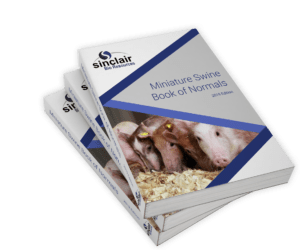Through selective breeding, a heritable ventricular septal defect (VSD) model has been produced in Yucatan and Micro-Yucatan miniature swine. The defect may be diagnosed with echocardiography either in utero or postnatally. Animals born with VSD can be diagnosed by auscultation of a typical mid to holosystolic murmur best auscultated over the 4th to 5th intercostal space near the sternal border.
Affected swine have been studied by angiography, echocardiograpy, and cardiac catheterization techniques. Most of the defects are located in the membranous septum below the crista supraventricularis. Left to right shunts are consistently demonstrated. A subset of the animals develops pulmonary hypertension over time, and some animals develop a failure to thrive syndrome associated with reduced stroke volume due to end-diastolic volume failing to increase adequately.
This VSD model shares many important similarities to human VSD, enabling them to be utilized as an animal model of the condition in humans and to be useful in preclinical treatment applications, including diagnosis and treatment of the condition or closure of the defect. Other potential applications include the study of environmental and genetic interactions with the occurrence of the defect as well as studies that require manipulation of cardiac function.

